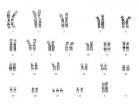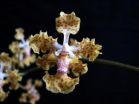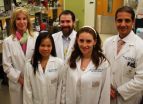(Press-News.org) CHICAGO, IL, April 17, 2014-- Colic affects about one in five infants in the United States annually and accounts for numerous pediatric visits during the first several months after birth. Research into probiotic use for reduction of colic symptoms was showing promise; however, the April 1, 2014 issue of the British Medical Journal (BMJ2014;348:g2107; Sung, Valerie) reported on a study, "Probiotics and Infant Colic," concluding that the use of the probiotic L reuteri for infant colic did not reduce crying or fussing in infants nor was it effective in improving infant sleep, functioning or quality of life. The results were no different for babies receiving breast milk or formula.
"The role of different intestinal microbes in producing or alleviating colic remains a subject of interest," says Joel Lavine, M.D., Ph.D., professor of pediatrics and chief of pediatric gastroenterology, hepatology and nutrition at Columbia University Medical Center. "Some studies have identified changes in the colonization that are associated with colic, although these changes have not been shown to be causative, and the specific kinds of bacteria potentially responsible have not been identified. Thus far, manipulation of gut colonization by probiotics remains an inexact science and conflicting evidence exists regarding the efficacy of probiotics in improving the problem."
Another under-discussed cause of colic symptoms, transient lactase deficiency (TLD), is known to be a cause of colic in about 38% of cases*. TLD is a temporary insufficiency of lactase enzyme, resulting in temporary digestive discomfort caused by the undigested lactose in breast milk or infant formula, often resulting in excessive crying and fussing, otherwise known as colic.
"Manipulation of bacterial populations in the gut may reduce the amount of gas produced by virtue of reducing lactose malabsorption," adds Dr. Lavine. "This problem of lactose malabsorption can be easily resolved by providing lactase to infants who are lacking, by way of commercially available infant drops."
INFORMATION:
Colief® Infant Drops is the only dietary supplement product that contains lactase enzyme that when added to either breast milk or milk-based infant formula, may help reduce the hours of crying by breaking down the lactose in the milk, making it easier to digest. Learn more at http://www.colief.com.
*Kanabar D, Randhawa M, Clayton P. Improvement of symptoms in infant colic following the reduction of lactose load with lactase. J Hum Nutr Diet. 2001; 14 (5): 359-363 END
New study says probiotic use for infant colic is not effective in reducing symptoms
Expert says reducing lactose malabsorption by adding lactase to milk may reduce the amount of gas in the infant gut, thereby resulting in a reduction of colic symptoms
2014-04-17
ELSE PRESS RELEASES FROM THIS DATE:
BUSM researchers find anti-seizure drug may reduce alcohol consumption
2014-04-17
Boston—Researchers from Boston University School of Medicine (BUSM) have discovered that the anti-seizure drug ezogabine, reduced alcohol consumption in an experimental model. The findings, reported in the American Journal of Drug and Alcohol Abuse, may lead to more effective treatments for alcoholism.
Excessive consumption of alcohol is one of the leading causes of illness and death in the U.S. and has significant negative economic impact by limiting the productivity of workers and necessitating huge health care expenditures.
According to the researchers, this study ...
Trisomy 21: How an extra little chromosome throws the entire genome off balance
2014-04-17
Occurring in about one per eight hundred births, Down syndrome - or trisomy 21 - is the most frequent genetic cause of intellectual disability. It results from a chromosomal abnormality where cells of affected individuals contain a third copy of chromosome 21 (1% of the human genome). A study conducted by Stylianos Antonarakis and his team in the Department of Genetic Medicine and Development at the University of Geneva (UNIGE) Faculty of Medicine, published in Nature, shed light on how the extra chromosome 21 upsets the equilibrium of the entire genome, causing a wide ...
Re-emergence of Ebola focuses need for global surveillance strategies
2014-04-17
NEW YORK – April 17, 2014 – EcoHealth Alliance, a nonprofit organization that focuses on conservation and global public health issues, published a comprehensive review today examining the current state of knowledge of the deadly Ebola and Marburg virus. The review calls for improved global surveillance strategies to combat the emergence of infectious diseases such as the recent outbreak of Ebola in West Africa that has claimed the lives of 122 people in the countries of Guinea and Liberia. According to the World Health Organization (WHO), the deadly Ebola virus can cause ...
Long-term effects of battle-related 'blast plus impact' concussive TBI in US military
2014-04-17
New Rochelle, NY, April 17, 2014—U.S. military personnel who served in Iraq and Afghanistan and suffered "blast plus impact" concussive traumatic brain injury (TBI) were compared to military personnel without TBI who were evacuated for other medical reasons. Differences in measures of overall disability, cognitive function, post-traumatic stress, and depression 6-12 months after injury are reported in an article in Journal of Neurotrauma, a peer-reviewed journal from Mary Ann Liebert, Inc., publishers. The article is available free on the Journal of Neurotrauma website ...
Fish consumption advisories fail to cover all types of contaminants
2014-04-17
A new modeling study suggests that fish consumption advisories for expecting mothers are ineffective in reducing infant exposure to long-lived contaminants like persistent organic pollutants (POPs).
The study, performed by a team of researchers including University of Toronto Scarborough PhD student Matt Binnington and Professor Frank Wania, looks at how different levels of environmental contamination, a mother's compliance with advisories, and the behavior of chemicals in the body influenced exposure in her children.
Their model estimates that women who stop eating ...
Proper stem cell function requires hydrogen sulfide
2014-04-17
Stem cells in bone marrow need to produce hydrogen sulfide in order to properly multiply and form bone tissue, according to a new study from the Center for Craniofacial Molecular Biology at the Herman Ostrow School of Dentistry of USC.
Professor Songtao Shi, principal investigator on the project, said the presence of hydrogen sulfide produced by the cells governs the flow of calcium ions. The essential ions activate a chain of cellular signals that results in osteogenesis, or the creation of new bone tissue, and keeps the breakdown of old bone tissue at a proper level.
Conversely, ...
Orchid named after UC Riverside researcher
2014-04-17
RIVERSIDE, Calif. — One day about eight years ago, Katia Silvera, a postdoctoral scholar at the University of California, Riverside, and her father were on a field trip in a mountainous area in central Panama when they stumbled upon an orchid they had never seen before.
Unable to identify it, they contacted German Carnevali, a world authority on orchids. The orchid turned out to be an unnamed species. So Carnevali recently named it after the Silveras: Lophiaris silverarum.
"Lophiaris" is the genus name, comprising about 40 species in the world. Carnevali, the director ...
New MRSA superbug emerges in Brazil
2014-04-17
An international research team led by Cesar A. Arias, M.D., Ph.D., at The University of Texas Health Science Center at Houston (UTHealth) has identified a new superbug that caused a bloodstream infection in a Brazilian patient. The report appeared in the April 17 issue of The New England Journal of Medicine.
The new superbug is part of a class of highly-resistant bacteria known as methicillin-resistant Staphylococcus aureus or MRSA, which is a major cause of hospital and community-associated infections. The superbug has also acquired high levels of resistance to vancomycin, ...
Study IDs new cause of brain bleeding immediately after stroke
2014-04-17
Irvine, Calif., April 17, 2014 — By discovering a new mechanism that allows blood to enter the brain immediately after a stroke, researchers at UC Irvine and the Salk Institute have opened the door to new therapies that may limit or prevent stroke-induced brain damage.
A complex and devastating neurological condition, stroke is the fourth-leading cause of death and primary reason for disability in the U.S. The blood-brain barrier is severely damaged in a stroke and lets blood-borne material into the brain, causing the permanent deficits in movement and cognition seen ...
20 years of data shows treatment technique improvement for advanced abdominal cancer
2014-04-17
WINSTON-SALEM, N.C. – April 17, 2014 – Meaningful long-term survival is possible for selected patients suffering from advanced cancer of the abdomen when treated with cytoreductive surgery with Hyperthermic IntraPeritoneal Chemotherapy, or HIPEC, according to a first-of-its-size analysis by physicians at Wake Forest Baptist Medical Center.
Wake Forest Baptist has the largest reported, single-center experience with cytoreductive surgery and HIPEC, said lead author Edward A. Levine, M.D., and analysis of 20 years' worth of patient data shows that outcomes have clearly improved ...
LAST 30 PRESS RELEASES:
Sleep loss linked to higher atrial fibrillation risk in working-age adults
Visible light-driven deracemization of α-aryl ketones synergistically catalyzed by thiophenols and chiral phosphoric acid
Most AI bots lack basic safety disclosures, study finds
How competitive gaming on discord fosters social connections
CU Anschutz School of Medicine receives best ranking in NIH funding in 20 years
Mayo Clinic opens patient information office in Cayman Islands
Phonon lasers unlock ultrabroadband acoustic frequency combs
Babies with an increased likelihood of autism may struggle to settle into deep, restorative sleep, according to a new study from the University of East Anglia.
National Reactor Innovation Center opens Molten Salt Thermophysical Examination Capability at INL
International Progressive MS Alliance awards €6.9 million to three studies researching therapies to address common symptoms of progressive MS
Can your soil’s color predict its health?
Biochar nanomaterials could transform medicine, energy, and climate solutions
Turning waste into power: scientists convert discarded phone batteries and industrial lignin into high-performance sodium battery materials
PhD student maps mysterious upper atmosphere of Uranus for the first time
Idaho National Laboratory to accelerate nuclear energy deployment with NVIDIA AI through the Genesis Mission
Blood test could help guide treatment decisions in germ cell tumors
New ‘scimitar-crested’ Spinosaurus species discovered in the central Sahara
“Cyborg” pancreatic organoids can monitor the maturation of islet cells
Technique to extract concepts from AI models can help steer and monitor model outputs
Study clarifies the cancer genome in domestic cats
Crested Spinosaurus fossil was aquatic, but lived 1,000 kilometers from the Tethys Sea
MULTI-evolve: Rapid evolution of complex multi-mutant proteins
A new method to steer AI output uncovers vulnerabilities and potential improvements
Why some objects in space look like snowmen
Flickering glacial climate may have shaped early human evolution
First AHA/ACC acute pulmonary embolism guideline: prompt diagnosis and treatment are key
Could “cyborg” transplants replace pancreatic tissue damaged by diabetes?
Hearing a molecule’s solo performance
Justice after trauma? Race, red tape keep sexual assault victims from compensation
Columbia researchers awarded ARPA-H funding to speed diagnosis of lymphatic disorders
[Press-News.org] New study says probiotic use for infant colic is not effective in reducing symptomsExpert says reducing lactose malabsorption by adding lactase to milk may reduce the amount of gas in the infant gut, thereby resulting in a reduction of colic symptoms





